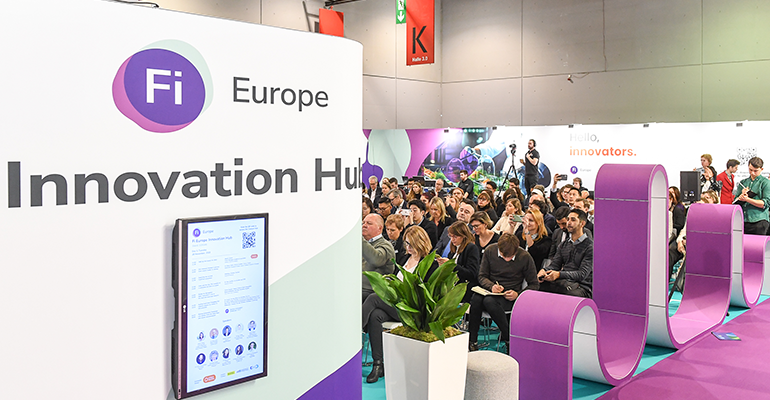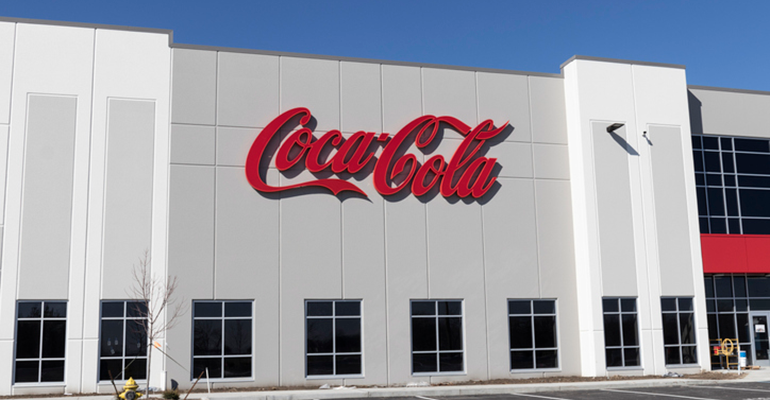News
Coca-Cola: Artificial intelligence could help vet open innovation partners
18 Dec 2023Artificial Intelligence (AI) could have a role to play in selecting startups and projects that corporates work with in open innovation partnerships, said Faisal Zanjani, global head of open innovation at The Coca-Cola Company, at Fi Europe.
In a presentation entitled Recipe for Disruption: Open innovation’s role in the food and beverage industry, Zanjani emphasised that some of the simplest and least glamorous ideas could be the strongest contenders for Open Innovation (OI) partnership.

As a case study to illustrate how OI can work, he discussed the 100+ accelerator, first established by AB InBev in 2018, and focused on sustainability. Coca-Cola, along with Colgate, Palmolive and Unilever, joined three years later.
“This year, we had over 2,000 applications for 100+,” Zanjani explained to his audience at the Fi Europe Innovation Hub. “We narrowed that down to a few hundred. We pay startups to run their experiments with us. It might be upcycling or could be related to emissions or climate action.”
AI can augment – not replace – humans
The process of reducing 2,000 solutions to between 400 and 500 is currently entrusted to an agency. Expert interviewers from each of the four corporates behind the accelerator then whittle this total down to a short-list of 200 or so.
“Getting from the initial 2,000 companies to 400, you could do that much faster with AI, and without biases being involved. Human biases always kick in.”
Talking in general terms about these types of function, he added the important clarification: “AI is only going to augment human. It’s not replacing human yet, and it’s a fairly safe bet that human involvement will continue for some time to come.”
Diversity is key in startup selection
Zanjani also made the point that 100+ is only one of the accelerators in which Coca-Cola participates. Others relate to areas including flavours and ingredients, processes, sensors and Industry 4.0.
Regarding the 100+ accelerator, which closed its fourth cohort in September this year, he underscored the diversity of the selected partners. “We experimented with or accelerated 116 solutions, coming from 30 different countries,” he said. Nearly 60% of these had women founders and close to a half were defined as ‘young’. Some 40% were from Africa and 15% from Asia Pacific.
He emphasised that, in applying to join an accelerator, a startup should “already have a certain level of product in place”.
 © iStock/jetcityimage
© iStock/jetcityimage
Big innovation can come from small solutions
Applicants should also ensure that their solution answers a need or solves a problem. Then again, he said, innovation does not have to operate on an eye-catching or spectacular level.
“You’d be surprised that, if you save 10 minutes of clean-in-place (CIP) process – washing, which is the most boring thing you can imagine – or a little bit of caustic in the washing process, it can save you tonnes of CO2, tonnes of money, and a lot of water,” Zanjani explained. “That would probably get prioritised over a very fancy solution that had all the bells and whistles, but which couldn’t be executed.”
Why should corporates pursue Open Innovation?
Zanjani also listed the three broad reasons why a large business such as Coca-Cola should use OI. Firstly, he said, “No single entity has all the smart ideas; we have to look beyond our four walls.” He pointed out that, while there were some 30,000 publicly listed companies around the world, the number of privately held businesses was closer to 330 million.
Secondly, he explained, certain types of innovation may be more successful when originating outside the organisation. “A lot of large companies are not as good at disrupting themselves or their own industries,” he stated. “Certain characteristics of these innovations will work better for a new entrant or startup, rather than for a large corporation.”
His final reason was that, for a business to “try to do everything” itself was highly inefficient, from the point of view both of money and effort.